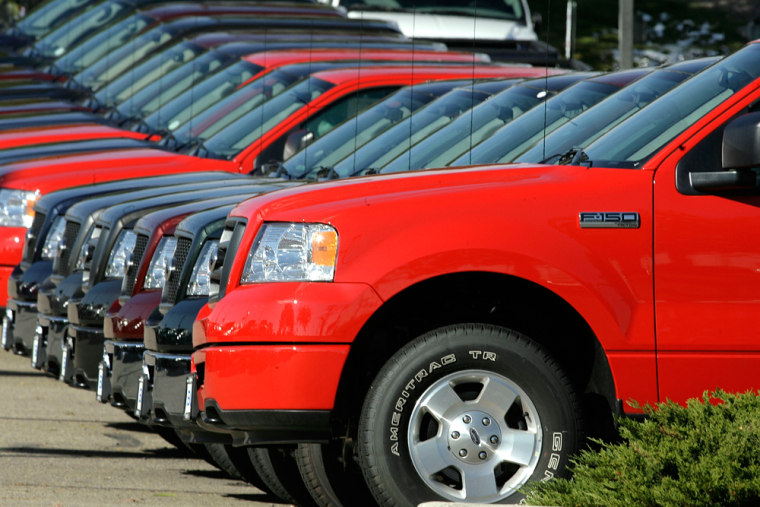The stock market downturn that has lopped more than 700 points off the Dow Jones industrial average in recent days may not be the only side effect of the nation’s stumbling housing market. The automotive industry appears to be suffering from the contagion, too.
Automakers reported weak July sales figures Wednesday, which industry analysts had predicted. That’s in part because of the soft housing market, which along with high gasoline prices is weighing on consumer spending.
Ford said Wednesday its U.S. sales plunged 19.1 percent, while General Motors said its July sales were down 22.3 percent. Even Toyota, which has enjoyed strong U.S. sales in recent months, said its U.S. car sales fell 11.8 percent last month.
“The industry stumbled this month on continued housing weakness,” Jim Lentz, executive vice president of Toyota Motor Sales, said in a statement.
“This housing market is putting consumers in a very sour mood,” said Mike Jackson, chief executive of AutoNation, the nation’s largest automotive retailer. “They’re not able to use the rising value of their homes like an ATM anymore because there’s a question mark over the market value of their homes, and in many cases they are struggling with higher monthly payments due to the higher cost of adjustable mortgages.”
AutoNation sent a chill through the market last week when it reported that its second-quarter profit and sales fell because of the downturn in housing markets in Florida and California, which account for half of AutoNation’s new-car sales and 20 percent of the U.S. total.
AutoNation has seen sales decline 14 percent in the two states as consumers pull back, Jackson said.
“All segments have been impacted to some degree, from luxury cars straight through to minivans,” he said. Even Asian automakers that have been outperforming their U.S. counterparts are seeing weakness “across the board,” he said.
Overall, new U.S. vehicle sales for July are expected to be down 7.9 percent from July 2006, according to Edmunds.com, an automotive information Web site. That will make for the worst July sales numbers since 2001, with just 1.37 million units sold in the month.
“That’s not a very good monthly number,” said Jesse Toprak, who heads up industry analysis at Edmunds.com. “We are seeing an overall weakness in the market place, an unwillingness on the part of consumers to make big purchase decisions.”
The downturn comes at a difficult time for the Big Three U.S. automakers of General Motors, Ford and Chrysler, which have been trying to turn things around after a years-long slump. The automakers all have been busy cutting costs and closing plants to become more competitive, and have just entered critical labor contract negotiations with the United Auto Workers union.
Shares of GM, the nation’s biggest automaker, jumped almost 30 percent in June as investors became more upbeat on the automaker’s outlook. And upbeat earnings reports over the past week from GM and Ford have raised hopes that the two automakers are straightening themselves out after billions of dollars in losses and talk of possible bankruptcies.
Automotive sales were down 9 percent in the first half of the year, and with no end in sight for the housing decline, Jackson predicts a continued decline in sales for months to come.
“This is a North American challenge,” he said.
“This is going to make things tougher for U.S. automakers,” he added. “They’ve made big structural changes over the last few years in terms of car design and their business models, but this is going to extend the timeline for their full recovery in North America.”
In an effort to boost sales, GM said on Monday it had begun offering zero-percent financing for up to 60 months on the extended and crew cab versions of its 2007 pickup trucks, responding to competitors’ discounts. Ford also is offering zero-percent financing and cash back on pickups, while Toyota is offering cash rebates on the Tundra, a new pickup it introduced in February.
Sales of Ford’s market-leading F-series pickups fell 4 percent in June, while GM said sales of its full-size pickups fell 27 percent.
Toprak notes that sales of pickup trucks — the bread-and-butter vehicles for GM, Ford and Chrysler because they are highly profitable — are likely to be weak again in July, hit by a decline in housing-related industries like construction that tend to rely on pickup trucks.
“It’s tough to find a direct correlation between auto sales and the housing market, but here we are seeing a direct impact from the housing slowdown,” Toprak said. “Pickup sales will be soft until later in the year, but I do expect sales to pick up late in the year, not because of growing demand but because of seasonality. Sales tend to pick up when we see the first big winter storms, usually in December.”
